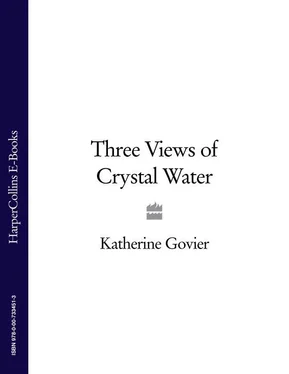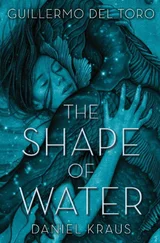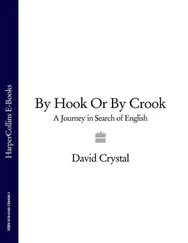Katherine Govier
Three Views of Crystal Water

Transparent things, through which the past shines.
Vladimir Nabokov
It is a warm day late in the season; the sky is clear and the sea is calm. We will dive in the deep. We meet early at the shore with our baskets; when we come back they will be full of abalone, if we are lucky. And we will be lucky, I feel it.
We women carry the lunch, and the men and boys bring little braziers to light in the centre of the boats. Although the day will be hot, the deep water will be so cold we will have to warm ourselves every hour.
We set out, boats behind the boats, towed by the two fishermen who have motors; four and then four more fishing boats sally forth in two obedient lines. We travel nearly a mile before the motors slow. As one we turn our heads to look back where we have come from. Our island lies behind, a saddle-shaped disk, low in the centre and higher at each end. On sharp, clear days in late summer it appears to have jumped off the surface of the sea: there is a little space under it, as if it were floating on an invisible cushion. But today the air is slightly misty and the summer island, as we call it, seems half sunk in the distance.
We have arrived at the deep fishing grounds, a semi-circular cluster of islands called the Watchers. Our lines of boats pass between two rough cones that erupt from the glass-topped sea. She is at her most docile – turquoise, almost flat, but moving in the long soft swells that are memories of a storm far away and days ago. Yes, the sea has memory: you can read it if you learn the signs.
Tamio unties us from the boats in front and behind. Because I have no brother, no father, no husband here, my boatman is Keiko’s nephew. He has only a shy smile for me and no words. He stands, holding the oar that fits into the little cut in the stern. When he has poled us to the diving spot I remove my yakata and stand, wearing only the thong the ama call the ‘black cat’.
The other women are not concerned to show their bodies. It is a matter of no importance to them; nearly naked is the way they have always dived and is the best way to dive. But I am unused to it, as I am unused to much that is custom in this place. Tamio looks down with covert curiosity: does he think a white woman’s nipples would be different? He holds the waist belt with its charges of lead to make me sink. But I don’t want it yet. I tuck my tegane into the thong where it crosses the small of my back. The knife makes me a little braver. I loop another rope around my waist, this one sixty feet long and heavy. Keiko’s nephew checks the knot. This will be my lifeline.
I keep my sights on the neighbouring boats. Hanako is in the nearest one; she is sixteen and an apprentice diver too, but we both know she will be very good one day. Hanako’s mother Maiko is just beyond: she is one of the best divers in the village. And Hanako’s grandmother too will dive today. She is fifty-five and has been diving for nearly forty years, since she was Hanako’s age. Grandmother loves to dive. She could have retired but she did not want to. She says she would have nothing to do all day and that she would miss the rest of us.
I keep my eyes on Hanako. When Maiko and Grandmother jump off the sides of the boats, she jumps. When she jumps, I jump.
I see Hanako’s feet leave the boat. I see the side rock down with the pressure of her jump, and then bounce up as her weight leaves it. I see her arms go up, in that gesture of submission one makes before entering water.
I see the hair lift off the back of her neck and fly into the air. I see her head enter the splash her feet made and the water close over it. I open my mouth, fill my lungs, and follow.
Oh, the shock of entry. Every time, it is as if I’ve never done this thing before; never left the safe air and gone feet first into this cold, wallowing, two-faced, foreign element. I call it alien, although in the sweet state it is what nourishes me and even fills my body: aren’t we ninety per cent water? But I fear this part of me. It is a world unto itself. I also adore it. Water is seductive, silky to the skin, welcome in its chill when the sun is burning. Endlessly lovely: sometimes a scroll, its lines of foam columns of script telling an ancient tale; sometimes a healer. It soothes, offering weightlessness and dream in exchange for consciousness.
But try to enter it! Its surface is a pane of glass I shatter at my peril. It stings. Its weight exaggerates any insult. It bulges and caves into great troughs. It tosses me like an angry parent. It sucks me down.
Bodies of water, we call them. Fresh, salt, dead, alive, still, fast-moving, tidal, land-locked. I know little about those other bodies which span the world, but I can tell you that the sea I plumb is a trickster. Lashing at the black lava rocks, tasting of the mysterious living things, shot with sunbeams or sunk in massive gloom, it is bitter to the nostrils and stinging to the lips. I’ve seen rock cliffs under water that trail air bubbles out of some crevice as if they were breathing.
But today the water is perfect. It is pale, silvery turquoise. Whoever named the aquamarine must have been looking at this water on just such a day. It gives me no shock. It fits over me gently. My feet, like arrowheads, make their bite and my body sails down their stream of froth. Easily, I stop my downward motion and with one strong scoop of my arms send myself back up to the surface. When I break it I shake the hair out of my eyes and little drops of sea water fly in bright radiance around my head. My friends, the other girls and women, bob on the surface, laughing to each other. They purse their lips then and make the mournful whistle they call the ama-bui . Then, silently, simply, they give a nod to their tomahi and bend, break the water with their faces and neatly tuck down.
I will do the same. First I fill my lungs with air. They expand in my chest, and for once there’s no tightness, no tension. I tuck my head under, jackknife at the hips and strike out with my legs while using my hands and arms to dig a downward path. It seems easy to drift head down toward the forest below. I pass startled small fish and see the shadows of larger ones flit beyond the corners of my eyes. Ahead of me, below are the tips of the tallest seaweeds and coral. The weed is a magnificent lime colour, and the coral wears new white and pink blooms. Today it’s all open, showing its heart to the penetrating sun, the magical ringmaster down here. Down further, twenty, twenty-five, thirty feet, I enter the green forest. The light-filled strands drift alongside my body but they don’t alarm me. I’m used to their touch. I can see, ahead of me, white sand and black rocks. The rocks lace the sand’s edges and promise a deeper place. I turn, and begin to swim along the sand floor. I can see crabs, and pink and purple suction cups on a tapered arm as an octopus suddenly retreats from my path.
Now the water darkens, over this valley in the sea floor. In a little crater I’ll find what I am looking for. My lungs are half empty. But I know how much air I have and can ration it. Rushing will not help. But neither can I waste time. I swerve, pushing the water away from my path first one way and then the other, hanging upside down, my hair below me like tassels, I thrust my hand into the crack, and feel for the rough edges of the shell. Holding on with one hand so that the drifts of water down here, like winds above the surface, don’t carry me away, I reach to the small of my back and bring out my knife.
Читать дальше




![Roger Zelazny - 24 Views of Mt. Fuji, by Hokusai [Illustrated]](/books/290246/roger-zelazny-24-views-of-mt-fuji-by-hokusai-il-thumb.webp)







